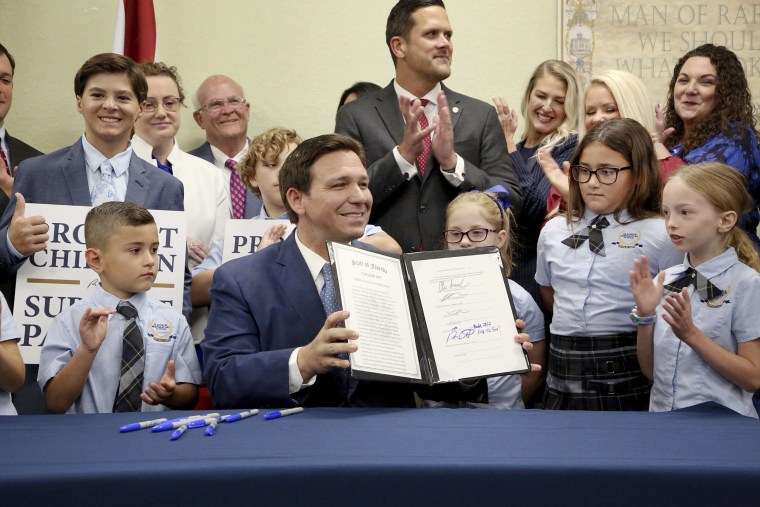From drag bans to sports restrictions, 75 anti-LGBTQ bills have become law in 2023
Becky Hormuth and her transgender son, Levi, thought they were protected after a Missouri law banning transition-related care for minors took effect in August.
The law grandfathered in those who had already been receiving puberty blockers or hormone therapy prior to Aug. 28, meaning they, in theory, would be able to continue their treatment. Levi, 16, began receiving testosterone in November of last year.
However, Missouri’s new law also allows providers of transition-related care for minors to be sued by their patients until they turn 36. As a result, the hospital where Levi had been receiving care for more than a year informed patients in September that it would no longer be providing such care, citing the “unsustainable liability” the law creates for health care professionals.
“We both just sat and cried together on the floor of his bedroom,” Becky said of the reaction she and Levi had upon hearing the news. “He connected with those doctors, and they’re like family to us — they know him personally. His big worry was, ‘Who’s going to help me now?’”
The Missouri law that affected Levi’s care is part of a national effort by Republican state lawmakers to restrict LGBTQ rights. More than 500 state bills targeting lesbian, gay, bisexual, transgender and queer people have been introduced in 2023, according to a tally by the American Civil Liberties Union. Of those bills, 75 became law, according to an NBC News analysis of the ACLU’s data.
The plurality of those laws — 21, including Missouri’s — are restrictions on transition-related care for minors, while 11 of them bar transgender student-athletes from playing on school sports teams that align with their gender identities. Ten of the laws limit classroom instruction on LGBTQ issues and/or the use of pronouns within school that don’t align with a person’s birth sex, and eight restrict which restrooms trans people can use in schools or other publicly owned buildings. The remaining laws restrict drag performances in front of minors, define a person’s sex in state law as that which was assigned at birth, and create additional barriers for trans people to change the sex on their birth certificates, among other measures.
Though 2023 was a record year for legislation targeting LGBTQ people, some advocates and experts say those who support LGBTQ rights are still coming out ahead, since just 75 of the approximately 500 bills proposed have become law, or about 15%.
Bans on gender-affirming care
Levi was one of an estimated 105,200 trans teens living in the 22 states that have laws restricting gender-affirming care as of October 2023, according to the Williams Institute at UCLA Law. Supporters of the laws argue that such care is experimental for minors and that these young people shouldn’t be able to make life-altering health care decisions. However, more than a dozen major medical organizations — including the American Medical Association, the American Academy of Pediatrics and the American Psychological Association — support such care and have opposed the state bans.
Becky said she has been planning for Missouri’s trans health care restrictions since the spring, when state officials started trying to limit minors’ access to transition-related care. At the time, she said, she didn’t know whether Levi would be grandfathered in. She hasn’t missed a refill for Levi’s testosterone and has rationed it so they have enough for next year.

Sitting in his mom’s car outside of his therapist’s office one day last month after school, Levi said he was worn out from the back-and-forth over whether he will have access to his health care.
“I’ve been hit with multiple waves of depression recently, and I’ve been lacking in my schoolwork because of all this,” he said.
In the spring, in addition to ensuring she has plenty of testosterone for Levi, Becky said she also reached out to the gender development program at Lurie Children’s Hospital in Chicago — a nearly five-hour drive from their home — to get on its waitlist in anticipation of Missouri passing the ban. She said she hopes Levi will have his first appointment there early next year.
The Hormuths and others affected by laws targeting LGBTQ people have been waiting for judges to rule on lawsuits filed against the measures.
So far, judges have issued temporary blocks, either partial or full, against gender-affirming care restrictions passed this year in Florida, Georgia, Montana and Indiana. Judges have upheld restrictions on gender-affirming care passed this year in Kentucky, Tennessee, Oklahoma, Missouri and Texas.
The plaintiffs in the Tennessee case appealed to the Supreme Court last month. If the court decides to take the case, it would be the first time it has considered a restriction on puberty blockers, hormone therapy and surgery for minors.
In the meantime, Levi said, the climate at his school has become more hostile. In one case, he said kids threw things at him on the bus and called him slurs. The incident was caught on camera, Becky said, and Francis Howell School District, where Becky is also a teacher, found that two students violated a district policy against harassment based on race, gender, sexuality and other protected categories when they made derogatory comments about Levi’s gender identity and threw objects at him, according to a letter provided to NBC News that the district sent to the Hormuths.
Jennifer Jolis, a spokesperson for the district, said it cannot comment on matters involving specific students due to privacy laws.
Restrictions on school instruction, sports participation
Educational institutions — from public elementary schools to private colleges that receive state funding — have become ground zero for the conservative-led effort to limit LGBTQ rights and access to information about the community. State bills signed into law this year have affected classroom instruction, extracurricular participation and access to sex-segregated school facilities, among other things.
Eleven states now have laws affecting what teachers can say about LGBTQ issues and how they can show up at work, with all but one of these measures having been passed this year.
On Wednesday, three Florida public school teachers sued the state Education Department over Florida’s Parental Rights in Education act, or what critics have dubbed the “Don’t Say Gay” law.

When the law was initially signed by Republican Gov. Ron DeSantis in March 2022, it prohibited “classroom instruction” on “sexual orientation or gender identity” in kindergarten through third grade “or in a manner that is not age-appropriate or developmentally appropriate.” The measure was then expanded in May to prohibit such classroom instruction from prekindergarten through eighth grade, restrict health education in sixth through 12th grade, and restrict what pronouns teachers and students can use.
After signing the first iteration of the bill, DeSantis said it ensures children will get “an education, not an indoctrination.” The expanded version, he said earlier this year, ensures teachers and students won’t be “forced to declare pronouns in school or be forced to use pronouns not based on biological sex.”
One of the three teachers who sued the state, AV Schwandes, who also goes by AV Vary, was fired in October for using the gender-neutral honorific “Mx.” instead of “Ms.” or “Mr.” in emails and other school communications.
Schwandes began using “Mx.” at the start of the school year, and a few weeks later the principal at Florida Virtual School, where Schwandes taught high school science, requested that Schwandes use a traditional honorific. When Schwandes refused, they received a directive, which they provided to NBC News, that said they had to change their courtesy title to comply with the law.
In mid-September, when Schwandes initially refused to change their honorific to “Ms.” or “Mr.,” they were suspended. They said they then suggested other gender-neutral titles they could use such as “professor,” “teacher” or “coach,” but Schwandes said staffers in the human resources department told them professor was a title used in college environments and not K-12 schools. Schwandes was terminated six weeks later, on Oct. 24, because they would not change their title.
The Florida Virtual School said in an emailed statement: “As a Florida public school, FLVS is obligated to follow Florida laws and regulations pertaining to public education. This includes laws … pertaining to the use of Personal Titles and Pronouns within Florida’s public school system.”
In addition to their lawsuit, Schwandes filed a complaint last month with the Florida Commission on Human Relations and the federal Equal Employment Opportunity Commission alleging the school discriminated against them based on their gender identity and violated Title VII of the Civil Rights Act of 1964.
Related stories
- Florida teacher who was fired for using gender-neutral honorific ‘Mx.’ sues the state
- Texas school district reverses decision that removed trans student from ‘Oklahoma!’
- Tennessee youths and doctor ask the Supreme Court to take up transgender care ban
- Meet the 13-year-old West Virginian suing to join her school’s track team
Andrew Spar, president of the Florida Education Association, the largest education workers union in the state, said he has heard from many LGBTQ teachers who are afraid of displaying photos of their families on their desks. He said what he hears from teachers the most is that the parental rights law and others restricting education in the state make it harder for them to do their jobs.
“The biggest question we get from teachers is if a student raises an issue that’s relevant to the class discussion, but it’s talking about gender or gender identity or sexual orientation,” Spar said. “Do we have to stop that conversation? And that’s where a lot of the confusion comes in.”
A judge dismissed a suit against Florida’s law in February, prior to the expansion, saying the plaintiffs didn’t have legal standing.
Currently, 23 states have laws on the books restricting which school sports teams transgender athletes can join, with about half of those laws being passed this year. Proponents of these measures say they help ensure fairness in women’s sports, while critics say they lack scientific evidence to prove trans women have an unfair advantage and that they marginalize trans students.
A Florida high school made national headlines last month when hundreds of its students staged a walkout after their principal and several other school officials were reportedly reassigned due to a trans student’s participation on the girls volleyball team. Earlier this week, the school was fined and put on probation, while the student has been barred from participating in any school sports for 11 months.

The laws specific to education have also trickled down to affect schools’ internal policies and school boards.
Last month, a Texas high school removed a trans student from his lead role in the school’s production of “Oklahoma!,” citing a new school policy that said students must play theater roles that match the sex on their birth certificates. After backlash from the largely conservative local community, the Sherman Independent School District reversed that decision and reinstated the student, Max Hightower, and other students who weren’t trans but had lost their roles playing characters that didn’t match their birth sex.
The rise and fall of drag bans
This year was the first to see state lawmakers file bills restricting drag performances in front of minors and/or in public spaces, which supporters of the legislation argue are necessary to protect children from inappropriate entertainment.
Lawmakers in at least 16 states introduced restrictions targeting drag in 2023, according to an NBC News analysis. Just six became law, and so far, they have been the least likely to hold up to judicial scrutiny.

Judges struck down two laws in Tennessee and Texas and temporarily blocked a restriction in Florida and another in Montana that specifically regulates events at public libraries where drag performers read to children.
Laws in Arkansas and North Dakota were so watered down during state legislative debates that advocates no longer consider them to be targeting drag.
Bracing for 2024
As Becky and Levi continue to grapple with the effects of Missouri’s trans care ban, they are anxiously looking ahead to the next legislative session in January. Becky said she fears 2024 could usher in more legislation targeting Levi and other LGBTQ people in the state. She cited recent reporting by independent journalist and advocate Erin Reed, who found that Missouri lawmakers have prefiled at least 21 bills targeting LGBTQ people.
“Some days when I wake up, I have that constant worry, because today is another day that’s gone by or going by, and it’s another day that’s closer to January,” Becky said.
It’s not just state laws that have her anxious about the new year: The school board for Levi’s district is also considering a policy to ban trans students from using the bathrooms that align with their gender identities. This led Levi, a senior, to decide that he won’t return to school for his last semester and will instead take his final credit either over the summer at his high school or at the local community college. As a result, he will miss homecoming, prom and graduation. Becky said she and her husband plan to sue if the bathroom policy is passed. The Francis Howell School District Board of Education did not return a request for comment.
Jolis, the district spokesperson, said the district does not comment on threatened or pending litigation, though she did confirm that a policy addressing restroom and locker room access had been proposed.
Gabriele Magni, an assistant professor of political science at Loyola Marymount University in Los Angeles and director of the school’s LGBTQ Politics Research Initiative, said the country likely hasn’t seen the end of legislation targeting LGBTQ people because it’s heading into an election year.
Early tracking of next year’s bills shows Magni could be right. Gillian Branstetter, a communications strategist for the ACLU, said the nonprofit is tracking 212 bills targeting LGBTQ people that have either been prefiled for the 2024 session or carried over from the 2023 session.
Magni said many of the bills that have become law in the last several years have succeeded in part because their supporters frame them as protecting children. He said the reason the majority of the bills did not pass is likely because they were not intended to pass in the first place. He said many Republican officials use them to drum up media attention, fundraise and drive voters to polls.
At the same time, he said, the fact that 2023 is still a record year for the proposal and passage of anti-LGBTQ laws shows that the tactic is spreading across states because Republicans now believe such legislation is necessary to be accepted by and supported within their party. In 2022, conservative lawmakers introduced more than 300 bills targeting LGBTQ people, and just 29 became law (less than 10%), according to the Human Rights Campaign. In 2021, lawmakers introduced more than 250 such bills, and 17 became law (about 7%), according to the HRC.
“This became a sort of vicious cycle in which no one wanted to be left behind,” Magni said. “They don’t want to be seen as less conservative or less active on these, and so in some cases in some states, we see the introduction of bills just more to not fall behind in these conservative ranking credentials rather than hoping that it will become legislation.”
The historic amount of legislation has also led to an equally historic level of protest on either side. Students have coordinated nationwide walkouts and protesters have packed state legislatures, while human rights groups have documented more than 300 anti-LGBTQ incidents in just the last year, including bomb threats against hospitals that provide transition-related care to minors and armed protesters outside of drag shows.

Phillip Hightower, whose trans son, Max, was removed and then reinstated in his school’s production of “Oklahoma!,” said he and his family won their fight for Max because more parents spoke out once they realized they had support, both within their mostly conservative community and across the country.
“Once it started to gain traction nationally, they felt safer,” he said.
Quoting 2019’s “Star Wars: The Rise of Skywalker,” Hightower said, “We’ve got friends out there. They’ll come if they know there’s hope.”